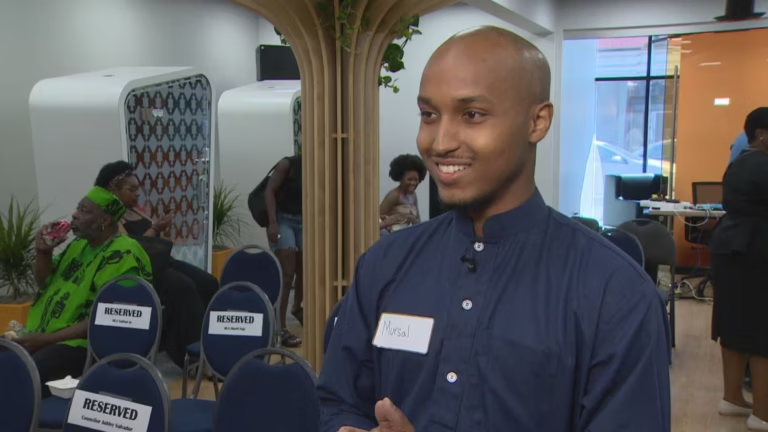When Emmanuel Onah reflects on his childhood in Kaduna, Nigeria, he remembers elders gathering under the shade of baobab trees to share wisdom, tell stories, and settle disputes. Decades later and thousands of kilometres away, that same spirit of knowledge-sharing is being revived in Edmonton through the launch of the Timbuktu Innovation Hub.
The centre officially opened on Alberta Avenue with a vibrant ribbon-cutting ceremony filled with African dance, drumming, fashion, and food. The hub, an initiative of the African Canadian Civic Engagement Council (ACCEC), will provide space for programs focused on business growth, youth empowerment, civic engagement, access to justice, gender-focused support, and community-based research.
For participants like 21-year-old soccer hopeful Abdulrahman Mursal, the hub represents more than just opportunity. “This space has given me confidence, a stronger voice, and a true sense of belonging,” he said, crediting the Timbuktu Trailblazers program for helping him build professional skills and prepare for future employment.
Symbolic plywood trees, designed into the building’s architecture, stood watch over the crowd during the celebrations—representing resilience, connection, and cultural continuity. Onah, co-founder of ACCEC, explained that the vision was to create a place where African Canadian youth could see their history and heritage reflected while finding new paths forward.
The hub draws inspiration from the ancient city of Timbuktu in Mali, once a centre of knowledge, trade, and innovation in the 15th and 16th centuries. Similarly, Edmonton’s version aims to foster creativity and progress within African, Caribbean, and Black communities by offering event spaces, digital media labs, and co-working areas.
Success stories are already emerging. Programs like Anza—a Swahili word meaning new beginning—have trained more than 70 young people, with nearly half going on to run their own businesses. One graduate, Nshuti Byamungu, launched Lumiere Disability Services, employing 10 staff after completing Anza’s training. Initially skeptical, he later described the program as “full of love” and life-changing support.
The project was made possible through collaboration, including a $25,000 grant from the Edmonton Community Foundation, support from Tropicana Community Services, and contributions from the City of Edmonton and Prairies Economic Development Canada. Internationally recognized architect Sam Oboh, who designed the hub, emphasized the importance of creating a trauma-informed, welcoming, and unapologetically African space.
“This is more than just a building—it is a safe, inspiring place that tells our story,” Oboh said. With golden stools and African-inspired motifs, the hub was intentionally designed to feel like sitting under a tree at home.
For Onah, the hub embodies a shared dream: “When communities imagine and work together, they don’t just create opportunities—they build legacies.”

